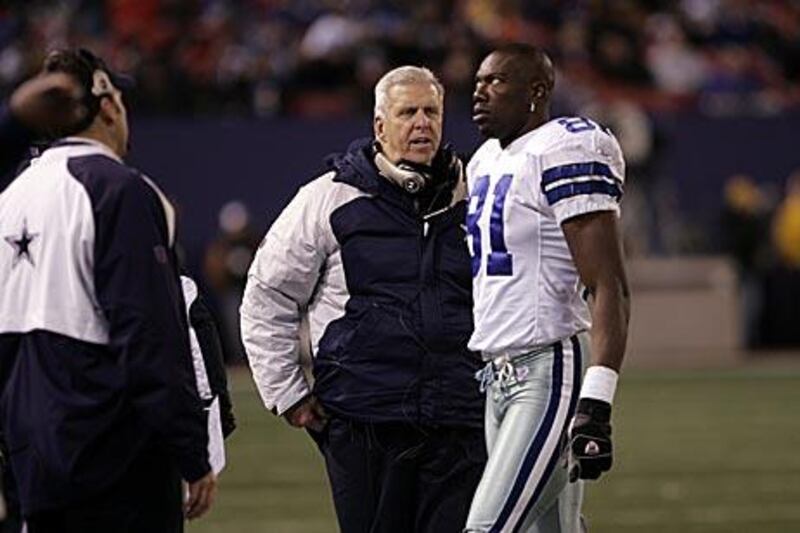Human beings' feelings toward famous coaches and managers tend to range from scorn to awe to scorn to respect to scorn to envy to scorn. But through time I have come to mix in another, stranger inkling: pity.
Certainly it could be wasteful to squander pity on the well-off, but you might have heard the news that money is far from everything and, besides, these souls roam a world of an almost-systemic lunacy.
It is a world that prompted Bill Parcells, the decorated American football coach, to say: "This is not a game for well-adjusted people," a maxim that might work for all known games even if camel polo might not be old enough just yet.
It came to mind again with the realisation this week that in the past five months, one Josef Hickersberger will have departed Al Wahda oddly, managed Bahrain for only four months and now returned to Al Wahda matter-of-factly, and that this does not seem all that offbeat anymore.
This would be, by the way, the manager who won the Pro League title last spring, a development that would suggest tranquillity in any business with any hint of normality.
Yet like many a manager in many a sport, Hickersberger knows little normality, having managed in the past two decades Austria, Fortuna Dusseldorf, Austria Wien, Al Ahli (Bahrain), Bahrain, Arab Contractors, Al-Shaab, Al Wasl, Al-Ittihad (Qatar), Rapid Wien, Austria again, Al Wahda, Bahrain again and Al Wahda again.
He might not need a new job so much as a nap. If somebody wrote a history of his second Bahrain tenure, it could appear as a pamphlet. At least it contains that rarefied experience of having managed against - and defeated by 3-0 - the famously fake team that represented Togo in a friendly.
He knows more than most about the mad world of managing in front of audiences often stuffed with impatient lunatics we commonly call "fans". For not only do managers work with the invisible hook ever hovering, and not only do they dwell with the risk of making a human gaffe that will go unforgotten, but they submit their careers to unusually fleeting fates.
Parcells himself won one Super Bowl that stamped him as worthy and then a second that stamped him as great, but for all his talent and toil the second came only when a gifted kicker missed a fairly long field-goal attempt on the last play.
A handful of baseball managers have lurked one strike or out or inning from major titles and never attained them, ever.
How must it have felt to be Fabio Capello and to spend two years readying an England team for South Africa, then after 40 minutes watch a harmless ball squirm through the hands of his goalkeeper?
Of the 20 managers who began the English Premier League season only three Augusts ago in 2008, only four remain with their clubs, a climate of gathering and breakneck impatience that only adds to the marvel of Arsene Wenger or Sir Alex Ferguson.
Yet even Ferguson famously endured a time when the corridors to the future narrowed uncomfortably. By the Saturday morning of January 7, 1990, his Manchester United had lost six and drawn two in their last eight games and slid to 15th in the old First Division awaiting a third-round FA Cup match at favoured Nottingham Forest. Newspapers called him "beleaguered," an adjective that looks absurd alongside his name.
It is a jolting job with poor security and outcomes often based on the whims of the young. Hickersberger knows. On the harrowing, inexplicable Wednesday night of September 12, 1990 - see, unforgettable - the Austria he had just managed into the 1990 World Cup missed on a horde of scoring opportunities and lost 1-0 to Faroe Islands in one of the biggest upsets in the history of anything.
The Faroe Islands scorer worked another job as a clerk in a timber office. The goalkeeper drove a lorry and wore a hat his grandmother had knitted. Even though Hickersberger had just signed a contract extension, he resigned pronto - off after a single evening at a neutral pitch in Sweden. Everyone saw this as rational.
Months after he resigned again from Austria after Euro 2008, the Austria Press Agency quoted him as saying with commendable wryness that a World Cup 2010 qualifying draw that included Faroe Islands had factored into the decision. "I'll watch the match on television and no matter the result, I will be glad not to be there," he said. "I don't want to be reminded of a match that took place 18 years ago."
Sounded like a wise man in a ludicrous business.





